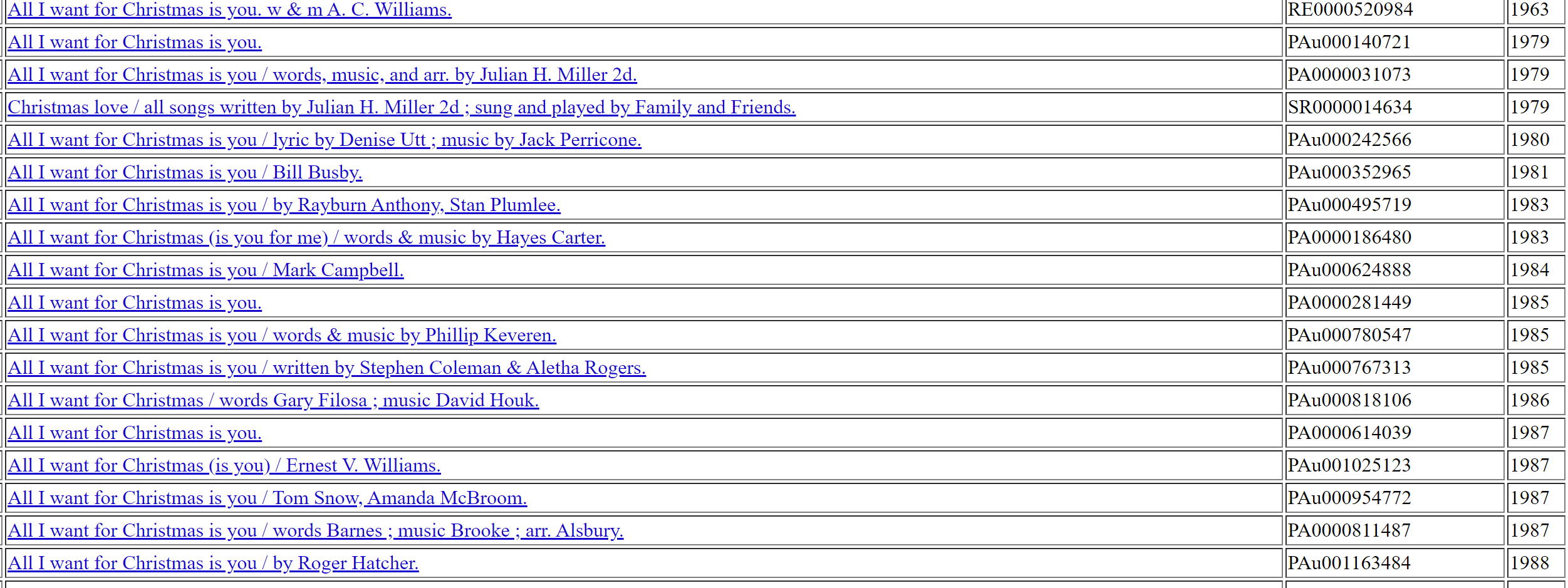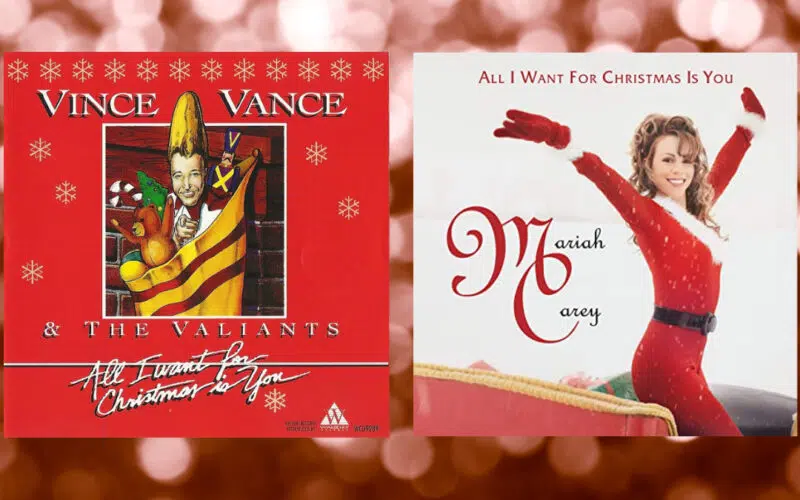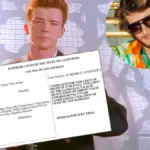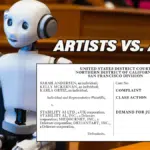Musician Andy “Vince Vance” Stone claims that Mariah Carey’s classic “All I Want for Christmas is You” infringes the copyright in his own song of the same name. Here’s why he’s wrong—and why the lawsuit never should have been filed.
UPDATE—November 1, 2022—Mariah Carey got an early Christmas present today, as Andy Stone, aka Vince Vance, dropped his lawsuit against her. The dismissal (read here) is without prejudice, which almost certainly means that no settlement was reached. It also means the case could still be refiled.
When I first heard that Mariah Carey had been sued over “All I Want for Christmas is You,” I assumed it was a class action for intolerable working conditions filed on behalf of seasonal mall employees.
It’s not, although that hypothetical lawsuit wouldn’t have been as frivolous as the copyright infringement complaint that was actually filed on Friday.
Carey’s song was first released nearly 28 years ago. Love it or hate it, unless you live in an underground bunker every year between November 1 and December 31, you definitely know it. In 2017, Billboard ranked the best holiday song from each of the last 50 years. Not surprisingly, the publication’s pick for 1994 was “All I Want for Christmas is You.”
What you may not know is that “All I Want for Christmas is You” also ranks as Billboard’s top holiday song of 1989. But it’s a completely different song, by a completely different artist—Louisiana-based novelty band Vince Vance & the Valiants.

During most of the 1980s, Vince Vance & The Valiants were best known for “Bomb Iran,” a parody of the Beach Boys’ “Barbara Ann,” which nearly cracked Billboard‘s Hot 100 in 1980. A departure from Vince Vance’s typical musical style, “All I Want for Christmas is You” is an old-school country waltz with an exuberantly cheesy music video.
While the Vince Vance song has been largely overshadowed by Carey’s megahit, it’s still fairly popular in its own right: the track charted on Billboard‘s Hot Country chart six different times between 1993 and 1999, and currently has over 4 million plays on Spotify. Two years ago, when Kelly Clarkson decided to release a cover version of “All I Want for Christmas is You,” she chose Vince Vance’s song over Mariah Carey’s.
Of course, there’s no denying that Carey’s “Christmas” is by far the more popular of the two songs. We’re talking 1 billion Spotify streams popular. Still, some people prefer the Vince Vance tune to Carey’s, and by all indications, the songs have peacefully co-existed for nearly 30 years—until now.
Cue the Copyright Lawsuit
On June 3, Vince Vance, also known as Andy Stone, filed a copyright infringement complaint (read here) against Mariah Carey, co-writer Walter Afanasieff and Sony Music. The lawsuit claims that Carey’s “All I Want for Christmas is You” infringes his rights in the 1989 song, which Vance co-authored.
As copyright infringement complaints go, this one is most notable for what it doesn’t include. For one thing, there’s no allegation that Carey actually copied anything from the Vince Vance song to create hers.
The complaint does contend that the defendants didn’t seek or get permission from Vance to use “All I Want for Christmas is You.” That’s no doubt true, but permission isn’t required if the defendants didn’t use any copyrightable material from the original song, and there’s no allegation here that they did.
The complaint doesn’t even allege that the two songs are substantially similar in protected expression, which is a foundational requirement in any copyright infringement case. Instead, Vance simply concludes that the defendants “knowingly, willfully, and intentionally engaged in a campaign to infringe” his copyright in the work “All I Want for Christmas is You.” That’s not enough to state a viable claim.
In addition to copyright infringement, Vance also alleges causes of action for misappropriation/unjust enrichment and a violation of the Lanham Act. The latter claim includes the especially head-scratching allegation that by giving their song the same title as his, the defendants intended to exploit the “popularity and unique style” of Vance’s original. Suffice it to say, the suggestion that Mariah Carey, who was already one of the biggest pop stars in the world in 1994, needed to ride Vince Vance’s coattails in order to get radio airplay is pretty far-fetched.
The $64,000 question is why Vance waited 28 years to file his case. The only rational explanation I can come up with is that he figured the publicity from the lawsuit (and there’s been a lot) would put a spotlight on his song and juice his streaming revenue. Of course, if this was the goal, I’m not sure why he filed the lawsuit in June instead of waiting until December. As it stands now, the complaint should be thrown out of court long before Christmas. Here are a few reasons why.
Copyright Doesn’t Protect Titles
We can all agree that the Mariah Carey and Vince Vance songs have identical titles, “All I Want for Christmas is You.” But guess what? So do over a hundred other songs registered with the U.S. Copyright Office, many of which predate both of the songs at issue in the new lawsuit.

The fact is that tons of popular songs share the same title but have nothing else in common, from “Creep” (Radiohead and TLC) to “Learning to Fly” (Pink Floyd and Tom Petty) to “One” (Metallica, U2, Ed Sheeran). And get this: Carly Simon, Damien Leith, Miguel, Roxy Music, Bryan Adams and U2 have all released completely different songs with the title “All I Want is You” (a title which itself is nearly identical to the one Vince Vance is suing over).
So why doesn’t the first artist to use a song title just file copyright infringement lawsuits against everyone else? It’s simple. Titles and short phrases don’t have a sufficient amount of authorship or creativity to qualify for copyright protection in the first place.
It is possible for a song title to be protected under trademark law in certain circumstances, but it’s not easy. Courts require a showing that the title has acquired “secondary meaning,” which can only happen if the consuming public has come to associate that title with a single source. Given the number of different songs using the title “All I Want for Christmas is You,” Vance likely won’t be able to show that the public associates that title primarily with him.
The Songs Sound Nothing Alike
If you write an immensely popular song, expect to be sued for copyright infringement. Call it the cost of doing business. From Ed Sheeran to Katy Perry to Led Zeppelin, copyright lawsuits are a dime a dozen. Just a few months ago I wrote about Dua Lipa being hit with two different complaints over “Levitating” in a single week. While the heirs of Marvin Gaye may have convinced a jury that “Blurred Lines” was too similar to the “vibe” of “Got to Give It Up,” don’t make the mistake of thinking that it’s easy to prove that one song infringes another. It’s not. And frankly, in the case of “All I Want for Christmas is You,” it’s not even a close call.
Apart from the titles, the two songs have the same basic (unprotectable) concept of missing someone at Christmas. The lyrics are different, with the exception of a few similar scène à faire phrases that flow from the basic concept. (Most notably, the subjects of both songs list items like stockings, snow and presents “underneath the Christmas tree” that they “don’t need” and are willing to give up to get the “one thing” they really want). The songs also have totally different melodies. If anything, the Vince Vance melody shares more in common with Bobby Vinton’s 1964 pop hit “My Heart Belongs to Only You,” than anything in the Carey song.
The Statute of Limitations Won’t Bar the Claim Entirely, But it Will Limit Damages
The biggest mystery of this entire lawsuit is why Vince Vance waited to file his complaint until nearly 30 years after Mariah Carey first released her song. The delay doesn’t make sense, but it doesn’t bar his claim.
Generally speaking, the statute of limitations under the Copyright Act is three years from the last act of infringement. Because Carey’s song is still being distributed, the statute hasn’t run. In addition, the U.S. Supreme Court has ruled that the equitable doctrine of laches can’t be used to bar an action for copyright damages that is filed within the three-year statute of limitations.
But this rule is subject to an important caveat: Vance is only entitled to claim damages going back three years before his suit was filed, i.e., June 2019. Any profits the defendants earned in the previous 25 years would be theirs to keep, even if Vance could prove infringement.
Some courts have allowed plaintiffs to reach back for damages incurred before the three-year lookback period if they can show that they didn’t discover and reasonably couldn’t have discovered the infringement earlier. But this “discovery rule” won’t apply to Vance’s case. Given the immense popularity of Carey’s song, there’s no way he shouldn’t have found out about it when Carey’s song was first released. Indeed, a bit of internet sleuthing shows that Vance gave an interview to Bayoubuzz.com discussing his views on Carey’s “All I Want for Christmas is You” back in December 2010:

Of course, there’s still the question of why Vance didn’t sue earlier. The 2010 Bayoubuzz interview may give us a clue. Vance said that he had “always believed” that Carey used his song as “a base for her version.” The use of an earlier work as a building block for a later one isn’t infringing unless the two works are substantially similar in their protected expression. It’s totally common (and in fact encouraged) to use one work as inspiration to create another. (To be clear, I have no idea whether Carey or Afanasieff had any knowledge of Vince Vance’s song at the time they wrote theirs.) Vance seems to have recognized years ago that while Carey’s song may share similar (unprotectable) “thematic elements” as hers, it’s a totally different tune.
My guess—and this is pure speculation—is that it took 28 years for Vance to find a lawyer who was willing to risk Rule 11 sanctions by taking on his case. That might also explain why the lawyer he eventually hired has been practicing for 45 years but (according to my quick PACER search) has never filed a copyright lawsuit—even though he lists “Copyright Infringement” as one of the practice areas on his website. (I’m sure he’s a good hurricane lawyer though.)
In any event, even though the complaint seeks a whopping 60 million dollars in damages ($20 million for each of its three causes of action), it’s highly unlikely that the defendants made anywhere close to that much money in the three years preceding the filing of Vance’s lawsuit. That’s all Vance would be able to legally recover even if he could prove his case.
Plaintiff (and Potentially His Lawyer) May be on the Hook for Mariah Carey’s Attorneys’ Fees
One of the reasons it’s important to hire a qualified copyright lawyer is so that he or she can properly advise you about the limitations period, about the fact that titles and general themes aren’t protectable—and importantly—to stop you from taking a flyer on a bogus infringement claim. Hopefully, Vance’s attorney informed him that the court has discretion to award attorneys’ fees to the prevailing party in a copyright infringement action. If not, that specialization in legal malpractice may come in handy.
The Bottom Line
If Vince Vance had just left things alone, he’d be best remembered for having the second most popular song with the title “All I Want for Christmas is You.” That’s no small feat. During his 2010 interview with Bayoubuzz, Vance seemed to recognize and take pride in that accomplishment, as well as he should. Even though Mariah Carey’s song had at that point been out for over 15 years, Vance rightfully boasted about his continued success. “[O]ne thing I know for sure is that the song truly has legs of its own. . . [The song] has been recorded by Sammy Kershaw, LeAnn Rimes with Brian Setzer Orchestra and Johnny Maestro. If you Google it you will find millions of mentions. . . It has been and continues to win accolades.”
Unfortunately, Vance’s signature song may now become best known for being the subject of an ill-fated copyright lawsuit, which would be a real shame. If Vance is looking to get a head start on his Christmas list, he might consider asking his lawyer to withdraw the complaint. It’s not too late to preserve his legacy, and that way he won’t end up with a lump of coal in his stocking come December.
Of course, that’s just what I think. I’d love to hear what you think, either in the comments section or on social media @copyrightlatey. My Twitter account is an especially good place to weigh in. Meanwhile, a copy of the complaint is below. Thanks for reading!
View Fullscreen






4 comments
I think the Ragin Bull decision, the Stairway to Heaven lawsuit, and the Blurred Lines verdict all factor in inspiring these lawsuits, which explains why they’re so many years after the fact.
Maybe he wanted to wait until Carey’s song hit 1 billion Spotify streams, just to make sure it was popular enough to be worth suing over.
I was at a Vince Vance concert in the late 80s when they sang the song. Became my favorite x-mas song. That would tick me off too if someone claimed they wrote it. I’m really mad for Vince. GOOD LUCK VINCE !!!
No one’s claiming they wrote the Vince Vance song. That’s still all his.